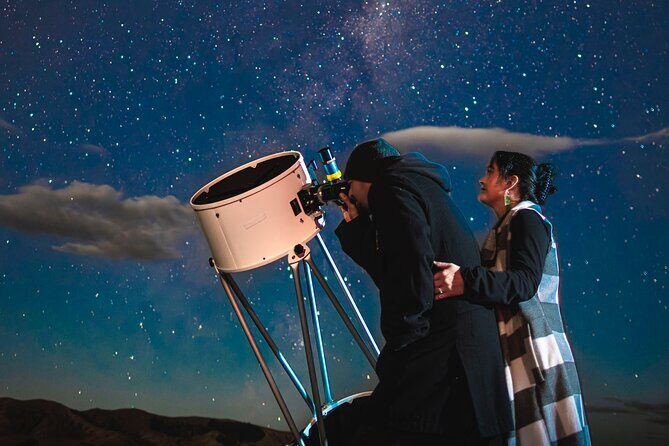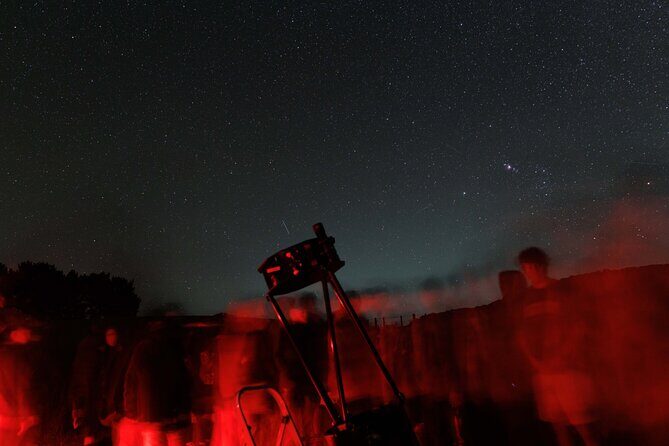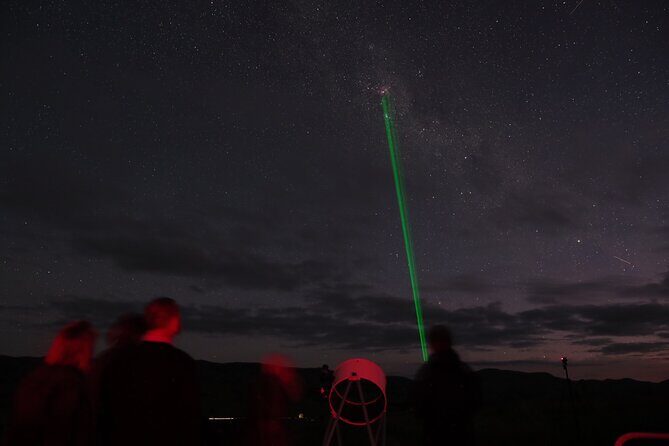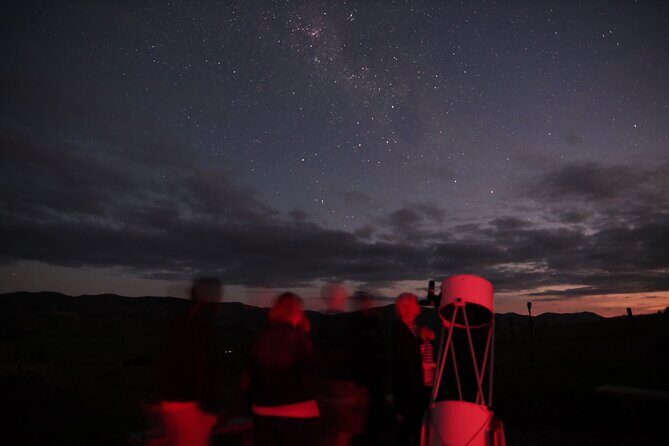- Discovering the Magic of Private Stargazing at Star Safari near Martinborough
- Key Points
- An In-Depth Look at the Experience
- The Setting and Location
- The Guides and Equipment
- The Experience Itself
- When the Sky Isn’t Clear
- The Cost and Value
- Who Should Consider This Tour?
- Final Thoughts
- FAQ
- More Safari Adventures in Wellington
- More Private Tours in Wellington
- More Tour Reviews in Wellington
- More Wellington experiences we've covered
Discovering the Magic of Private Stargazing at Star Safari near Martinborough

Imagine an evening under one of the best night skies in the world—away from city lights, surrounded by silence, and with a clear view of the universe’s wonders. That’s exactly what you get with Star Safari’s private stargazing experience near Martinborough, just a short drive from Wellington. For $152.71 per person, you’re treated to about 90 minutes of personalized celestial discovery, guided by astrophysicists Hari and Sam, in a setting rated perfect for stargazing with a 5.0/5 review score from delighted travelers.
What makes this experience truly special? First, it’s the exclusive nature—your group gets the whole set-up to yourselves, avoiding the crowded vibe of many astronomy tours. Second, the state-of-the-art equipment, including two 16-inch telescopes and virtual reality tools, means you’ll see the stars and planets in stunning detail, even if the weather doesn’t cooperate. Our favorite feature? The location—an internationally recognized Dark Sky Reserve—ensures some of the clearest, most spectacular skies you’ll find anywhere in New Zealand.
Of course, a possible consideration is the minimum booking requirement of two adults, which might make it tricky for solo travelers or very small groups. Also, this experience is weather-dependent; if clouds roll in, the guides switch gears and take you on a virtual journey through the cosmos instead. For those willing to embrace the unpredictable weather, the chance to see Saturn’s rings or Jupiter’s moons up close makes it worth it.
Whether you’re a space enthusiast, a romantic couple, or traveling with family, this tour offers an authentic and educational evening you’ll remember. It’s especially well-suited for those who appreciate cutting-edge technology, stunning natural surroundings, or simply want a meaningful break from typical sightseeing.
Key Points

- Private Experience: You and your group get exclusive access, avoiding crowds.
- Excellent Equipment: Powerful telescopes and virtual reality add to the awe.
- Ideal Location: On a hill within a dark sky reserve, offering exceptional views.
- Flexible Program: Weather may shift the focus from real stars to digital exploration.
- Educational Value: Guides are highly knowledgeable, eager to answer questions.
- Family Friendly: No age limit for children, with free entry for those 15 and under.
Prefer personalized experiences? Here are other private options we've covered in Wellington
An In-Depth Look at the Experience
The Setting and Location
Starting just 10 minutes from Martinborough, the tour takes place at 1169A Ponatahi Road, amid lush farmland and rolling hills. The spot is deliberately chosen for its dark skies, free from light pollution, making it a prime location for star gazing. The site is part of an internationally recognized Dark Sky Reserve, meaning the sky here is as dark as it gets—ideal for seeing faint deep-sky objects that might otherwise fade into the background glow of city lights.
The viewing area is inside a Moon Garden, a small dedicated space where the telescopes are set up. It’s easy to get comfortable here—with blankets and jackets available—so you can settle in and gaze for as long as you like, often for 60-90 minutes.
The Guides and Equipment
Hari and Sam are the hosts—one a TEDx featured astrobiologist, the other an astrophysicist—who bring both expertise and enthusiasm to your experience. Their professional backgrounds mean you’ll get accurate, engaging explanations of what you’re seeing, along with friendly answers to your questions.
The equipment is top-notch. Two 16-inch telescopes are the stars of the show, capable of revealing details like Saturn’s rings or Jupiter’s moons. The guides also use a range of other telescopes and planetarium software to enhance the experience further. If the weather doesn’t cooperate, don’t worry—virtual reality comes into play, offering a 3D tour of the Solar System, and the guides will take you on a digital voyage rather than just a cloudy night.
The Experience Itself
Upon arrival, you’ll be greeted and invited to get cozy inside the Moon Garden. The guides will provide blankets and warm beverages—hot chocolate or tea—so you stay comfortable while gazing. If the sky is clear, you’ll step up to the telescopes, with views that can include distant galaxies, star clusters, or planets.
What sets this tour apart is the personalized approach. It’s not a large group broadcast; it’s tailored to your interests and questions. Many reviews highlight how knowledgeable and friendly Hari and Sam are, with one reviewer mentioning, “The people who run it are incredible,” and another noting how “real science filled me and my kids with awe.”
While in Wellington, here are other experiences we've covered
When the Sky Isn’t Clear
Weather can always be a wild card with stargazing. Clouds, rain, or fog will obscure the stars, but the hosts have a backup plan—virtual reality and planetarium software. This alternative isn’t just a consolation prize; it’s a high-tech way to explore the universe in incredible detail, from the comfort of the Moon Garden.
The Cost and Value
At just over $150, this experience offers a great value considering the private setting, expert guides, and quality equipment. It’s comparable to other premium astronomy tours but stands out because of its exclusivity and the ability to tailor the session to your interests. Given the reviews, many travelers feel it’s a worthwhile investment in a memorable night under the stars, with some noting they found it “an easy to get to from Wellington” and “just awesome.”
Who Should Consider This Tour?
This experience is perfect for families with children, as kids of all ages are welcome, and the hosts often make the science accessible and fun. It’s also ideal for couples or small groups who want a romantic or intimate outing. Space enthusiasts will love the chance to see planets up close, while casual travelers will appreciate the relaxed, informative atmosphere.
Final Thoughts

The Private Stargazing at Star Safari offers a rare chance to experience the night sky in a setting designed for maximum clarity and comfort. The combination of state-of-the-art telescopes, expert hosts, and the dark sky reserve location creates a memorable, educational outing that’s well worth the price. The flexibility of virtual reality options further enhances its appeal, especially if the weather doesn’t cooperate.
For those who seek a personalized, authentic astronomy experience in New Zealand—away from city lights and tourist crowds—this tour hits the mark. It’s a blend of science, natural beauty, and technology that leaves you with a deeper appreciation of the universe and the night sky’s true splendor.
In short, if you’re looking for an out-of-this-world adventure that balances education, awe, and comfort, this stargazing tour deserves a spot on your travel list.
FAQ

Is this a private experience?
Yes, the tour is exclusive to your group, meaning no sharing the telescopes or the experience with strangers.
How long does the tour last?
The main session runs about 90 minutes, but it can extend slightly if time permits, giving you plenty of opportunity to explore and ask questions.
What is included in the cost?
You get access to professional instructors, high-quality telescopes, a customized program, hot beverages, and all taxes and fees.
Are children allowed?
Absolutely, children 15 and under are free, with no lower age limit, making it family-friendly.
What happens if the weather is bad?
If poor weather prevents stargazing, the hosts switch to an e-astronomy experience with planetarium software and virtual reality, which still offers an engaging look at the universe.
What equipment will I see?
With the telescopes, you might see planets like Saturn and Jupiter, star clusters, and other deep-sky objects, depending on the night’s conditions.
More Safari Adventures in Wellington
More Private Tours in Wellington
- Kapiti Private Tour in Tesla SUV
- Spectacular Wellington: Half Day Private Sightseeing Tour
- Wellington city heights private tour with Weta Workshop
- Spectacular Wellington: Full Day Private Sightseeing Tour
- Private Transfer from Wellington Port to Wellington Airport (WLG)
- Private Martinborough Wine Tour in an Electric Vehicle – Tesla Model Y
More Tour Reviews in Wellington
- Pkaha National Wildlife Centre Guided Tour from Wellington
- Wellington: Half-Day Lord of the Rings Locations Tour
- Museum of New Zealand Te Papa Tongarewa Entry Ticket
- Wellington Jewish Heritage sightseeing tour with a kosher lunch
- Kapiti Private Tour in Tesla SUV
- Spectacular Wellington: Half Day Private Sightseeing Tour
More Wellington experiences we've covered
- You’ll Love These 8 Workshops & Classes In Wellington
- The 15 Best Wine Tours In Wellington
- Discover 10 Great Walking Tours In Wellington
- Wellington’s 15 Top Tours (With Prices)
- The 6 Most Popular Shore Excursions In Wellington
- Which Wellington Lunch Experiences To Choose? Our Best 11 Picks
- What Are The Best Historical Tours In Wellington? Our Top 4 Picks
- 5 Best Helicopter Flights & Tours In Wellington
- Wellington’s 10 Top Full-Day Tours (With Prices)
- Discover 12 Great Food Tours In Wellington
- 6 Top-Rated Wellington Craft Beer Tours
- We Rank The 15 Best City Tours In Wellington
